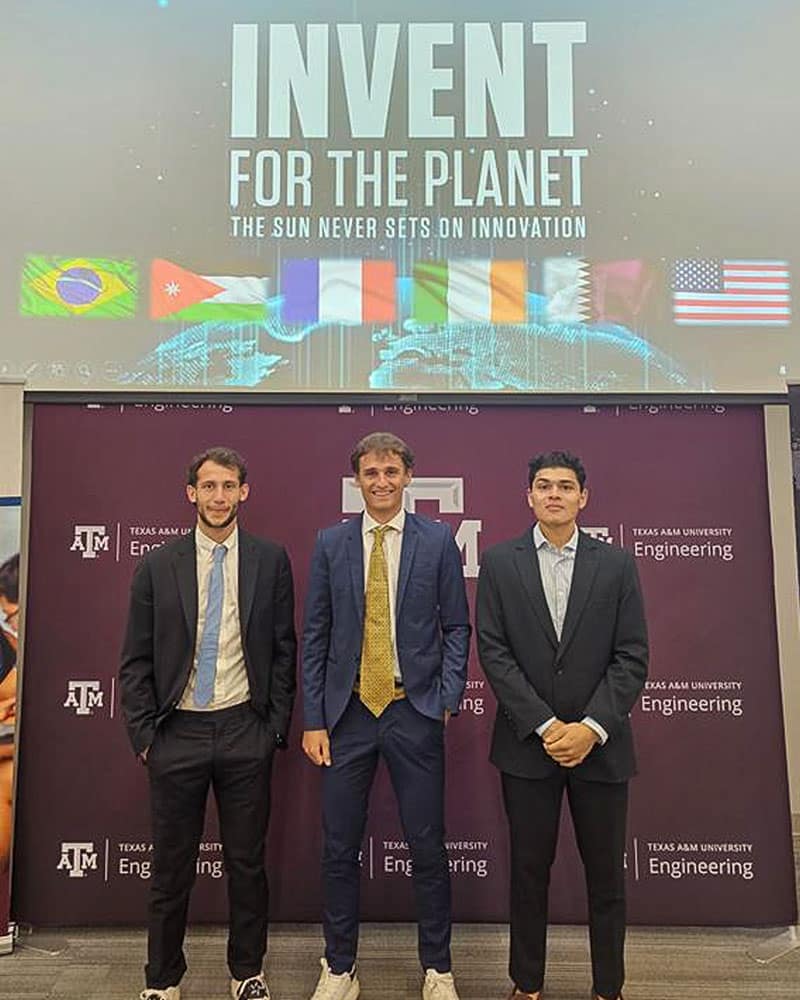Embry-Riddle Student Team Plants the Seed for Smart Farming System

A competition that challenged students to solve pressing global issues led an Embry-Riddle Aeronautical University team to propose a high-tech system for one of humanity’s oldest and most vital jobs: farming.
Engineering students Emanuele Bossi, Francesco Busini and Diego Spross developed their Agri-AI concept — an artificial intelligence-powered precision agriculture system — for the Invent for the Planet (IFTP) challenge, an international competition hosted by Texas A&M University.
“The main goal of this competition was to find a solution that would improve our planet for the future,” said Busini, a Mechanical Engineering student. “We developed our project to improve agricultural methods to be smarter and more efficient.”
Agri-AI integrates sensors, satellite data and machine learning to monitor soil health, predict weather events, and automate irrigation and fertilization. The goal is to conserve water and fertilizer, reduce environmental harm and increase crop yields while helping farmers become more resilient to a continually shifting climate.
“We think our solution is unique because a lot of water and resources are wasted due to inefficient farming,” said Bossi, who is double majoring in Software Engineering and Data Science. “With Agri-AI, we can help bring about a better economic return to farmers.”
According to the team, the Agri-AI concept aims to reduce agricultural water use by up to 40% while increasing crop yields up to 30%. Agriculture accounts for nearly 70% of worldwide freshwater withdrawals, according to Our World in Data.
“Climate change is threatening global food production,” said Spross, an Aerospace Engineering student. “With rising temperatures, extreme weather and water shortages, farming is becoming more challenging. We wanted to design a system that could help.”
A drone-based delivery system forms the core of the Agri-AI project. Solar-powered uncrewed aerial systems (UAS) monitor crop health, detect diseases early, and apply water or fertilizer only where and when needed. The team’s prototype, modeled using CATIA, a 3D design software, included a solar-charging station and onboard storage for precise application.
“Our project consisted of three stages,” explained Bossi. “First, we collect data using IoT (Internet of Things) sensors. Second, we use machine learning algorithms to predict watering needs. Third, drones are deployed to carry out smart irrigation.”

Seven teams pitched their innovative engineering concepts to judges at the championship event. (Photo: Courtesy of Texas A&M)
An Idea Sprouts in 48 Hours
Bossi, Busini and Spross came up with the idea for Agri-AI during a 48-hour innovation sprint at Embry-Riddle’s Invent for the Plant event on the Prescott Campus. The event, held in February and organized by the Advanced Polytechnic Engineering Experience (APEX) and hosted by the College of Engineering, was coordinated by student Ela Ozatay, who invited students from across disciplines to form teams.
“Applying the engineering skills our students develop to solve societal problems reinforces the idea that creating value for society is at the heart of engineering,” said Dr. Hadi Ali, assistant professor of Aerospace Engineering and a judge at the event. “It encourages students to build on the curiosity they already have to make a difference.”
Bossi, Busini and Spross took the top spot at the Embry-Riddle event, and the team was invited to submit their project to the global IFTP selection committee, which chose the team as one of only seven from around the world to advance to the championship round at Texas A&M in College Station, Texas.
At Texas A&M, the Embry-Riddle team presented their concept to judges and peers from across the globe. Their passion and technical depth stood out, despite being the only team without a fully built working prototype.
“Agri-AI had a creative and elegant solution to a significant problem,” said Jim Donnell, professor of practice and executive director of the Meloy Engineering Innovation & Entrepreneurship Program at Texas A&M University. “In addition to demonstrating their engineering brilliance, they did an extremely good job pitching their concept to the panel of judges.”
Dr. Maria Claudia B. Alves, senior director of Halliburton Engineering Global Programs at Texas A&M University, praised the students for a project that not only helped with food security but also reduced the amount of water used in agriculture. Agri-AI, however, was not selected as the top project.
“Judging the finals was a very difficult task and a testament to the boundless creativity and innovation of our future engineers,” Alves said.
Though all three students have their senior year ahead of them, they hope to continue developing Agri-AI and are open to research grants, sponsorships or other forms of support to build a full-scale prototype. With the global precision agriculture market projected to approach $30 billion by 2033, the team sees continued opportunities for their system.
“I was impressed by how they responded to the challenge,” said Ali. “It’s a remarkable illustration of how we as educators should not only emphasize content alone but also how to prepare students to create impact.”

 Keaton S. Ziem
Keaton S. Ziem